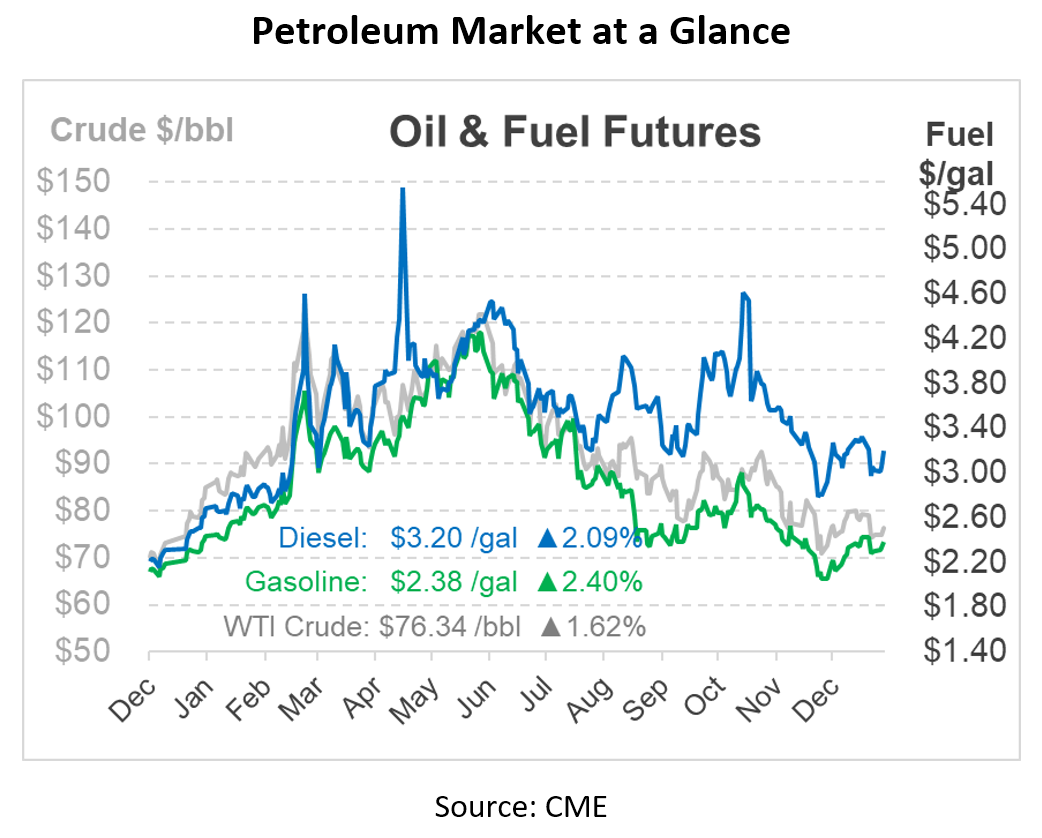
What Is It – Refinery
Refineries are a daily topic of conversation in our industry. From utilization and product blends to maintenance and outages, they are all over the downstream fuel market’s news. Without refineries, however, we would not have any fuel. With that said, let’s talk more about what a refinery is and how it produces end products.
What is a Refinery?
A refinery is a facility that processes crude oil and other raw materials into more useful products such as gasoline, diesel fuel, and various types of petrochemicals. These products are made through a series of chemical reactions and physical processes that involve heating, distillation, and other separation techniques. Refineries are an important part of the oil and gas industry, and they play a critical role in meeting the world’s energy needs.
Crude oil is a complex mixture of hydrocarbons and other substances that are extracted from the ground through drilling or other means. It is not suitable for use as a fuel or for many different applications in its raw form; therefore, it must be refined to make it more useful.
Where do refineries get the crude oil from?
Refineries typically get crude oil from a variety of sources, including oil fields, offshore platforms, and other locations where it is extracted from the ground. Refineries may also purchase crude oil from other countries, depending on the availability and price of oil from different sources.
How do refineries convert crude oil?
Refineries use a variety of processes to break down the complex molecules in crude oil and other feedstocks into simpler, more useful molecules. For a helpful overview of the refining process, check out this video:
Refineries produce a wide range of products, including gasoline, diesel fuel, aviation fuel, heating oil, lubricating oils, and other petrochemicals. The specific products produced at a refinery depend on the characteristics of the feedstocks and the technology used at the facility. In some cases, refineries may process other types of feedstocks, such as natural gas liquids (NGLs) or biomass.
There are several steps involved in the process of refining crude oil into gasoline and diesel fuel. These steps can be grouped into three main categories: separation, conversion, and treatment.
- Separation: The first step in the refining process is separation, in which the various components of crude oil are separated based on their boiling points. This is typically done using a distillation column, which works by heating the crude oil to a high temperature and then allowing it to cool. As the oil cools, different components will vaporize and condense at different points along the column, allowing them to be collected separately.
- Conversion: After the various components of the crude oil have been separated, they are then converted into more valuable products. This is done through a process called cracking, where the larger, more complex hydrocarbons in the oil are broken down into smaller molecules. This can be done through various methods, including thermal cracking, catalytic cracking, and hydrocracking.
- Treatment: The final step in the refining process is treatment, in which the products are cleaned and treated to remove any impurities or unwanted byproducts. This can include processes such as de-sulfurization, which removes sulfur compounds from gasoline or diesel fuel to reduce emissions.
Where does most US refining take place?
According to the EIA, Texas is home to the majority of US refineries. As of 2021, there were 24 refineries in Texas, accounting for about 32% of the total refining capacity in the United States. Other states with a significant number of refineries include Louisiana, California, and Oklahoma.
It is worth noting that the number of refineries in the United States has declined over the past several decades due to various factors, including increased competition from abroad and the increasing use of alternative fuels. However, the refining industry remains an integral part of the U.S. energy sector and plays a critical role in meeting the country’s energy needs.
This article is part of Daily Market News & Insights
Tagged:
MARKET CONDITION REPORT - DISCLAIMER
The information contained herein is derived from sources believed to be reliable; however, this information is not guaranteed as to its accuracy or completeness. Furthermore, no responsibility is assumed for use of this material and no express or implied warranties or guarantees are made. This material and any view or comment expressed herein are provided for informational purposes only and should not be construed in any way as an inducement or recommendation to buy or sell products, commodity futures or options contracts.









